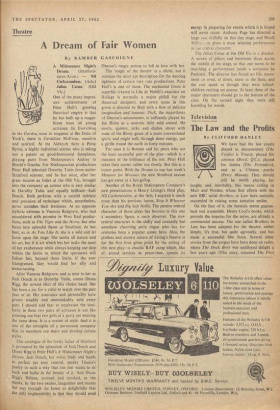Theatre
A Dream of Fair Women
By BAMBER
GASCOIGNE
A Midsummer Night's
Dream. (Stratford- upon-Avon.) — Nil Carborundum. (Arts.) Julius Ctesar. (Old Vic.) ONE of the many impres- sive achievements of Peter Hall's growing theatrical empire is that he has built up a magni- ficent team of young actresses. In Everything in the Garden, soon to reappear at the Duke of York's, there is Geraldine McEwan, sensitive and satirical. At the Aldwych there is. Patsy Byrne, a highly individual actress who is taking out a patent on good-humoured dumpiness, playing parts from Shakespeare's Audrey to Brecht's Grusha. For Shakespearian productions Peter Hall inherited Dorothy Tutin from earlier Stratford seasons; and he has since, after her great success as Juliet at the Old Vic, brought into the company an actress who is very similar to Dorothy Tutin and equally brilliant—Judi Dench. Both perform with a careful subtlety and precision of technique which, nevertheless, never tarnishes their freshness. At an opposite stylistic extreme is Vanessa Redgrave, who had smouldered with promise in West End produc- tions, such as The Tiger and the Horse, but who burst into splendid flame at Stratford. At her best, as in As You Like It, she is a wild colt let loose upon the stage. She seems all nature and no art, but it is art which lets her make the most of her exuberance while always keeping one skip within the limits to which the spectators will follow her; beyond those limits, if she ever transgressed, they would find her silly and embarrassing.
After Vanessa Redgrave, and as near to her as Judi Dench is to Dorothy Tutin, comes Diana Rigg, the newest elect of this choice band. She has been a joy for a critic to watch over the past year or so. Her assurance and personality have grown steadily and unmistakably with every part. I should add that to emphasise the simi- larity in these two pairs of actresses is not like pointing out that two girls at a party are wearing the same dress. It is a matter of style. And it is one of the strengths of a permanent company that its members can share and develop certain styles.
This catalogue of the lovely ladies of Stratford is prompted by the splendour of Judi Dench and Diana Rigg in Peter Hall's A Midsummer Night's Dream. Judi Dench, her voice, body and hands in perfect yet easy control, speaks Titania's poetry in such a way that one just wants to sit back and bathe in the beauty of it. And Diana Rigg's Helena, scorned and mocked, as she thinks, by the two swains, languishes and moans her way through the forest so delightfully that the only implausibility is that they should need Oberon's magic potion to fall in love with her.
The 'magic of the theatre' is a cliché, but it remains the most apt description for the dancing lightness of certain very rare productions. Peter Hall's is one of these. The enchanted forest is superbly created in Lila de Nobili's exquisite set (foliage is normally a major pitfall for the theatrical designer), and every scene in this grove is directed by Hall with a flow of delicate imagination and humour. Puck, the majordomo of Oberon's amusements, is brilliantly played by fan Holm as a neurotic little wild animal. He snorts, quivers, jerks and dashes about with none of the flimsy grace of a more conventional spirit, and might well, through sheer energy, put a girdle round the earth in forty minutes.
For once it is Bottom and his peers who are the least successful part of the play—which is a' measure of the brilliance of the rest. Peter Hall takes their scenes rather too slowly. But this is a minor point. With the Dream to cap last week's Measure for Measure the new Stratford season has got away at a fast gallop.
Another of the Royal Shakespeare Company's new presentations is Henry Livings's third play, Nil Carborundunt, at the Arts. I enjoyed it much more than his previous farces, Stop It Whoever You Are and Big Soft Nellie. The passive central character of those plays has become in this one a secondary figure, a mere observer. The new central character is the shifty and cowardly but somehow charming petty rogue who has for centuries been a popular comic hero. Also, the plotless and aimless nature of Living's theatre is for the first time given point by the setting of this new play—a chaotic RAF camp which, like al! armed services in peace-time, spends its energy in preparing for events which it is hoped will never occur. Anthony Page has directed a large cast skilfully on this tiny stage, and Nicoll gives a most winning performance Lite central character.
The Julius Ciesar at the Old Vic is a disaster. A screen of pillars and buttresses slices across the middle of the stage, so that one seems to be watching a performance inside a sculpture by Paolozzi. The director• has found no life, move- ment or even, at times, sense in the lines, and the cast speak as though they were school- children reciting set poems. At least three of the major characters should go to the bottom of the class. On the second night they were still fumbling for words.














































 Previous page
Previous page